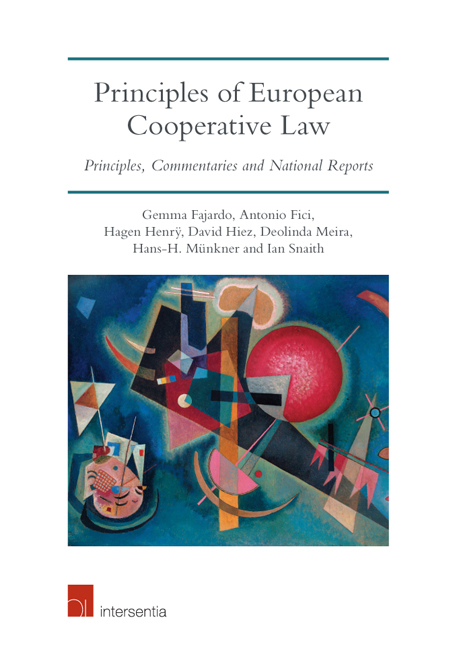Book contents
- Frontmatter
- Foreword
- Contents
- List of Abbreviations
- Introduction
- Part I Principles of European Cooperative Law and Commentaries
- Chapter 1 Definition and Objectives of Cooperatives
- Chapter 2 Cooperative Governance
- Chapter 3 Cooperative Financial Structure
- Chapter 4 Cooperative Audit
- Chapter 5 Cooperation Among Cooperatives
- Part II National Reports
- About the Authors
Chapter 1 - Definition and Objectives of Cooperatives
from Part I - Principles of European Cooperative Law and Commentaries
Published online by Cambridge University Press: 22 September 2018
- Frontmatter
- Foreword
- Contents
- List of Abbreviations
- Introduction
- Part I Principles of European Cooperative Law and Commentaries
- Chapter 1 Definition and Objectives of Cooperatives
- Chapter 2 Cooperative Governance
- Chapter 3 Cooperative Financial Structure
- Chapter 4 Cooperative Audit
- Chapter 5 Cooperation Among Cooperatives
- Part II National Reports
- About the Authors
Summary
(1) Cooperatives are legal persons governed by private law that carry on any economic activity without profit as the ultimate purpose and mainly in the interest of their members, as consumers, providers or workers of the cooperative enterprise.
(2)‘Profit as the ultimate purpose’ means making profits mainly for the payment of interest, dividends or bonuses on money invested or deposited with, or lent to, the cooperative or any other person.
(3) For the purpose in paragraph (1),‘cooperative enterprise’ may include an enterprise carried out by a subsidiary if this is necessary to satisfy the interests of the members and the members of the cooperative maintain the ultimate control of the subsidiary.
(4) Cooperatives may also be established to carry on an economic activity mainly in the general interest of the community (‘general interest cooperatives’).
(5) Cooperatives shall include in their registered name the word‘cooperative’,‘coop’, or similar. The words‘cooperative’,‘coop’, or similar, may not be included in the name of entities not formed and managed as cooperatives in accordance with cooperative law and universally recognised cooperative values and principles.
COMMENTARY
The first provision of the Principles of European Cooperative Law (PECOL) is a definition of the subject matter dealt with, namely cooperatives. Th is is consistent with a practice common in European cooperative law. A definition of cooperatives may be found in almost all the jurisdictions considered for and within the PECOL project: see art. 2511 of the Italian Civil Code (ICC); art. 2(1) of the Portuguese Cooperative Code (PCC); art. 1(1) of French Law no. 47-1775 (FrCA); para. 1(1) of the German Cooperative Act of 1889 (GCA); art. 1(1) of Spanish Law no. 27/1999 (LC).
By contrast, European Regulation no. 1435/2003 (SCE R) does not contain a definition proper of the European Cooperative Society (SCE), although the SCE is immediately identified by certain characteristics, including member and capital variability and the objective pursued (art. 1 SCE R). A definition of a cooperative is also lacking in the Finnish Cooperative Act no. 421/2013 (FiCA).
- Type
- Chapter
- Information
- Principles of European Cooperative LawPrinciples, Commentaries and National Reports, pp. 19 - 46Publisher: IntersentiaPrint publication year: 2017
- 4
- Cited by



